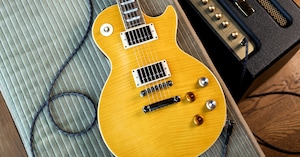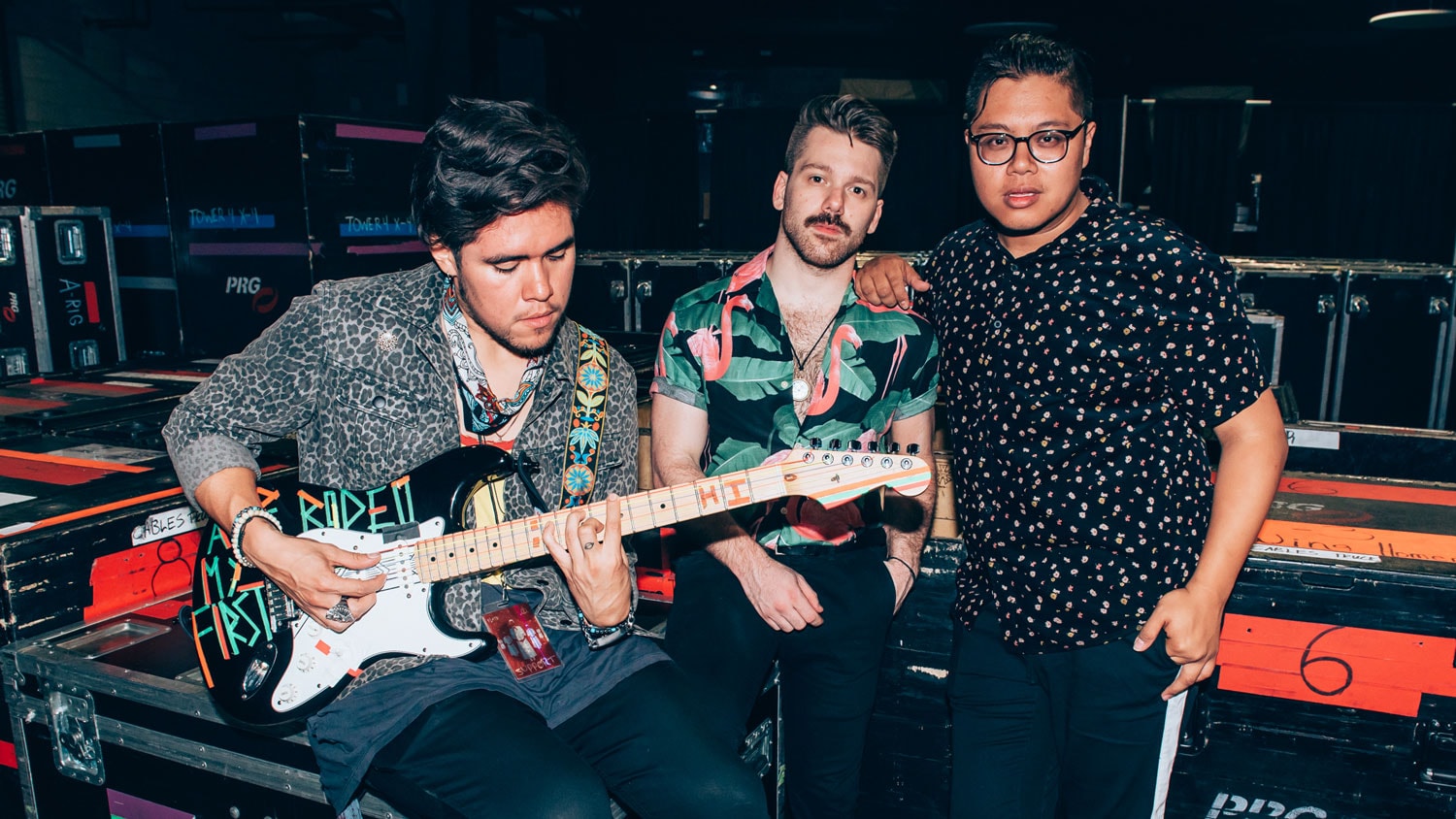Starting their journey as three college kids in Boston, A R I Z O N A have come quite the distance since their days of playing the east coast's rock club scene. Now, the band's genre-bending 'electronic-hybrid' sound has opened the doors for touring new music, as well as headlining festivals across the country.
We caught up with Nate, David, Zach and their touring crew just before they opened for Panic! At The Disco at the Staples Center in Los Angeles, where we chatted about their current gear lineup, how it has evolved throughout the years, and why techs are the true superheroes of any successful touring band.
Tell us about the gear you brought on this tour.
David (Keys): For mics, we're using a Telefunken M-81 Universal Dynamic Microphone on a Shure UHF-R, run to front-of-house with a TASCAM TA-1VP. For Zach, we're using a Waves MultiRack. Live, we use the same chain that we use in the studio, which is a Waves CLA-76 Compressor Limiter, PuigTec EQP-1, H-Delay and some Kramer for slapback. We're also all on JH Audio JH16V2s Custom Ears, and those have been phenomenal for us. As for the keys, I have a Yamaha CP33, an M-Audio Keystation 61 and a Behringer X-Touch Mini on the left side, with an AKAI MPD226 Pad Controller. They're all going to a rack that I have on stage, which gets run off-stage over ethernet using the iConnectMIDI4+. Then, I have two MacBook Pros running Ableton for playback (A and B in case one of them fails), then a Radial Engineering SW8 to switch between. A third computer has MainStage, and I run all of my virtual instruments from there. I'm actually playing a lot of parts.
Nate (Guitar): My main baby is a Fender Stratocaster. I run it through an Octa > Heather Brown Electronicals Blessed Mother > Fulltone OCD > Strymon Riverside > Walrus Julia > Strymon Deco > Mobius > TimeLine > BigSky - that all goes through a VOX Custom AC-15. It's all looped through a Mastermind. I also play a D'Angelico Premier Series onstage, and then there's this other arts and craft guitar I have. [Points to guitar smashed during set]

Do you smash a guitar during every set?
Nate: No, it was actually the first time I've ever played it.
David: [Laughs] How is it still one piece?
Tell us a little bit more about your pedal board evolution.
Nate: Prior to this tour, my board was really simple. Just an OCD, BigSky, TimeLine - that was pretty much it, wasn't it?
David: Yeah.

How has your gear changed throughout your history as a group together?
Zach (Vocals): We were always studio nerds. We made our first album in Jersey, then started recording here in North Hollywood. We grew up doing music - David had been on stage before, Nate was in bands. I was the only guy who was completely unfamiliar with it. I'd never been on stage, ever. We were all just studio kids. So when we started playing shows, I learned more about the particular pieces of the gear and the way things get set up, different capabilities, etc. From our first show at The Studio at Webster Hall until now, I've watched the production grow so much. We were just on the Behringer X32 Compact Digital Mixer, and I had a TC Electronic Vocal Processor, which was great for what I was doing at the time. I would control all of my effects from stage, and just send it to front of house. My station stayed that way for a long time. I literally used Shure 215s up until this tour. And they were great. But slowly, gear would get added to each station. On this tour, everything got an overhaul. Now everyone has their own station, and it's so crazy. All in like a year and a half.
David: Before, it was like we could get away with being so scrappy. We used to solder our own snakes - Nate used to solder in college at Berklee as part of the shop team, so it's therapeutic for him. Nate would do most of the soldering because I was not as good. Leading up to this tour, when we knew we were playing in front of so many people, we had to add redundancy - elements that would allow us to be quick with the changeover. It's funny though, because we still do a lot of things the same. We refuse upgrade our computers because we're afraid they'll become unstable. We're cautiously old-school in a way - but because it's electronic hybrid music, we have to push the boundaries. That's why Nate's rig is driven by a really smart looper, and that's why Zach's rig is able to be preprogrammed - the less we have to focus on dealing with twisting knobs, the more we can focus on actually performing and connecting with the people. This tour setup really allowed us to pursue things that we had only imagined before.
Zach: We've become a lot more free to perform now on this particular tour. David is still locked into his station, but there are definitely special moments that we have now on this tour because of the way it's all set up.
David: And our wonderful techs, too.
Zach: Because of these guys, yeah. Yesterday, Nate snapped a string in the middle of a song, and by the time I turned my head, Charlie was already restringing it right offstage. These guys are the homies - there's just been so much less to worry about on that end. Now, David will leave his station sometimes and high-five us on stage and dance around, and Nate's running all over the place. There's more freedom to focus on, like David said, just kind of having fun.
Advice for when things go wrong?
Zach: Things definitely go wrong. That's the other thing about gear. No matter how good the gear is, no matter how tight your setup is, no matter how many times you double-check shit - something is always going to fail. Everyone's trying to focus on performing in front of 20,000 people, and all of a sudden, your talkback lights up in your ear, and you think I'm in the middle of a verse, great - let's just fight through it. But watching the team and the techs mobilize when things go wrong is almost like the most beautiful part about it. Handling the gear and putting the human element - finding those efficiencies sometimes is the coolest part about, even though it might suck in the moment. We know our system so well because we built it from literal scratch - these guys will point out directly on stage where it's happening and they can go to it and fix it. Our first festival we ever played literally ever was Hangout in Alabama - one of our favorite festivals. It was my first time ever playing a festival. My playback rig went down because it was too hot and it went, and we were on a beach in the middle of summer. It went down for two songs - we started to notice things were starting to feel empty - but it was just us, we were our techs. In moments like that, our relationship is what saves us. It's not the gear or, or the contingency or whatever it is. You look at each other and because you're all so tight, friends from back home, it takes a split second to look at each other and go fuck it. We all pop an ear out and we just jam. Get the crowd into it. You get them hyped, and at the end of the day, a live show is a live show. It's an experience. You are there to connect with the audience, not to put on the most technically flawless show in the world. You're there to burn it to the ground.
What do you think the future of live music will look like 20-30 years from now?
David: I think we're going to see so much more technology developed in terms of sensors and space. We're seeing more companies like Roli, who are taking the keyboard to another level - we're going to see more of the same. Where music becomes an extension of your movement, or an extension of your mind. We're going to see more tangible things that are taking non-traditional forms. Maybe you could take the barometric pressure of a room and like feed it to your synth. Someone's going to figure out how to read the entire mood of a room through facial recognition, and then like feed that to a synthesizer. It'll be a once-in-a-lifetime kind of experience. At the end of "Oceans", it just breaks down into one synth for the last couple of bars.
Zach: However the crowd is feeling would affect what would happen to the synth each night. That would be nuts.
David: Think of those chords that pull the heartstrings - imagine if you could just have that happen every night, made possible by the crowd.
Zach: It'd be pretty lit, right?
David: Sure would.
You can check out A R I Z O N A's latest single "Freaking Out" below:




